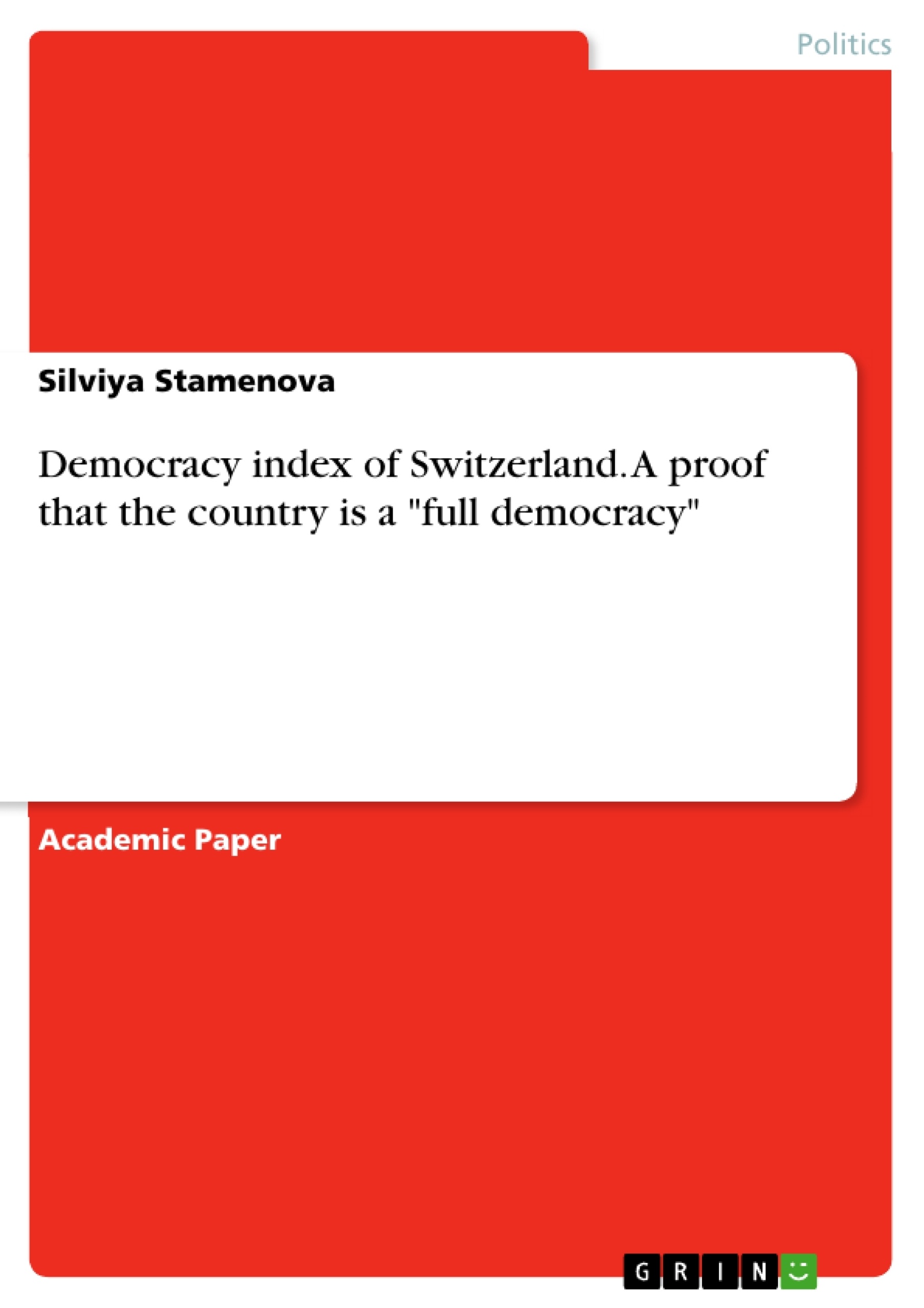The present research examines the question of the democracy index of Switzerland. Moreover, its investigation is obligatory as recent literature on the subject connects the level of democracy of a particular country to its level of development and innovation. However, the latter is a concept usually ignored in the establishment of relevant policies and action strategies. Thus, the present paper debates the question that the democracy index of a country such as Switzerland places it among the countries having the highest level of "full democracy".
Inhaltsverzeichnis (Table of Contents)
- Abstract
- Introduction
- Hypothesis
- General characteristics of Switzerland
- Basic information
- Economy of Switzerland
- A methodology of the research
- Categorization of democracy-related questions
- Results
- Summary and conclusions
- References
Zielsetzung und Themenschwerpunkte (Objectives and Key Themes)
This research explores the democracy index of Switzerland, examining its correlation with the country's development and innovation levels. It aims to analyze Switzerland's ranking as a "full democracy" within the global context.
- The relationship between democracy and development/innovation
- The significance of democracy indices in assessing national progress
- The democratic landscape of Switzerland in comparison to other countries
- The methodology used for evaluating democracy indices
- The specific characteristics of Switzerland that contribute to its high democracy index
Zusammenfassung der Kapitel (Chapter Summaries)
- Abstract: This section provides a brief overview of the research topic and its relevance in the context of global development and innovation.
- Introduction: The introduction delves into the relationship between democracy and development, referencing existing literature and highlighting the importance of understanding democracy indices. It also provides background information about the research methodology and its focus on Switzerland's 2015 democracy index.
- Hypothesis: This section outlines the primary hypothesis of the research, suggesting that Switzerland aligns with the EU Index of 2015, signifying its status as a full economy country.
- General characteristics of Switzerland: This section provides a detailed overview of Switzerland's basic information, including its geographical location, population, demographics, and economic strengths. It emphasizes Switzerland's unique political structure, characterized by its federal parliamentary republic system and autonomous cantons.
- Economy of Switzerland: This section highlights the highly developed nature of Switzerland's economy, emphasizing key sectors like banking, chocolate, dairy products, watches, and tourism. It also discusses Switzerland's non-EU membership and its stable trade connections with Europe.
- A methodology of the research: This section details the research methodology, explaining the use of questionnaires, a combination of dichotomous and three-point scoring systems, and a total of 60 indicators. It highlights the categorization of democracy-related questions.
- Categorization of democracy-related questions: This section outlines the specific questions used to assess Switzerland's democracy index, focusing on areas such as political participation, political culture, and civil liberties. It provides concrete examples of the scoring system and criteria applied to these questions.
Schlüsselwörter (Keywords)
The key themes and concepts explored in this research include democracy index, Switzerland, development, innovation, political participation, political culture, civil liberties, full democracy, federal parliamentary republic, autonomous cantons, economic strength, and neutrality.
Frequently Asked Questions
Is Switzerland considered a full democracy?
Yes, according to democracy indices, Switzerland is consistently ranked among the countries with the highest levels of "full democracy" due to its political stability and civil liberties.
What is the link between democracy and innovation?
Research suggests that higher levels of democracy often correlate with higher levels of development and innovation, as democratic structures foster freedom of thought and economic stability.
What makes the Swiss political system unique?
Switzerland is a federal parliamentary republic characterized by its autonomous cantons and a high degree of direct political participation by its citizens.
How is the democracy index measured in this research?
The methodology uses 60 indicators across categories like political participation, political culture, and civil liberties, using a scoring system to rank the country.
What are the key sectors of Switzerland's economy?
Key sectors include banking, watchmaking, pharmaceuticals, chocolate, dairy products, and tourism, all contributing to its status as a highly developed nation.
- Citar trabajo
- Silviya Stamenova (Autor), 2016, Democracy index of Switzerland. A proof that the country is a "full democracy", Múnich, GRIN Verlag, https://www.grin.com/document/437196



